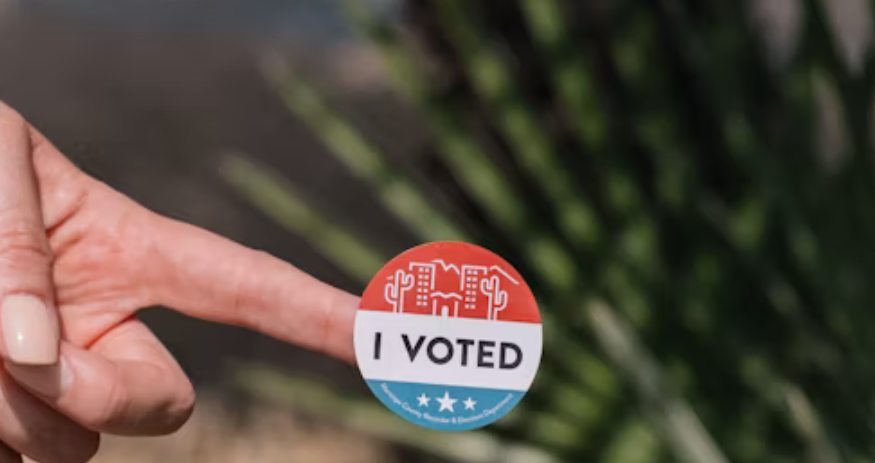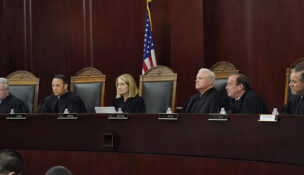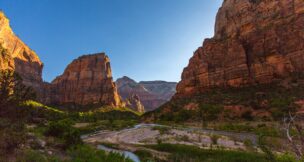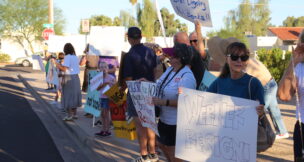Judge rules primary election measure stays on ballot
Howard Fischer, Capitol Media Services//September 19, 2024//
Judge rules primary election measure stays on ballot
Howard Fischer, Capitol Media Services//September 19, 2024//
A trial judge ruled Sept. 19 that Arizonans are entitled to decide whether to scrap the current system of partisan primaries.
Maricopa County Superior Court Judge Frank Moskowitz, appointed by then Gov. Jan Brewer, acknowledged there was evidence that challengers proved that 37,657 signatures on petitions to put Proposition 140 on the ballot were duplicates. That, by itself, should have left the initiative without sufficient signatures.
The judge pointed out, however, that the ballots went to the printer at the end of August, with the language of the ballot measure included. And Moskowitz said the failure of challenges to have proven their claim of duplicate signatures by that date ended the matter.
That decision is virtually certain to be appealed by challengers to the Arizona Supreme Court.
But Moskowitz is prepared for that.
If the justices don’t accept his conclusion that the ballot printing deadline made the whole case moot, he has two other reasons the case should be thrown out.
One relates to how the calculations were made to bring the number of valid signatures below the 383,923 needed to qualify for the ballot. The judge said it illegally “double counted” some invalid signatures.
And if the justices don’t buy either of those arguments, Moskowitz has an ultimate fallback.
He said the challengers, recognizing the ballots already have been printed, asked him to order state and county election officials to simply not count the votes for or against the measure. Only thing is, Moskowitz said, nothing in state law allows him to issue such an order.
“Perhaps the absence of such express authority in statute is because the Legislature never intended for initiative challenges to go past the ballot printing deadline,” he wrote.
Scot Mussi, president of the Free Enterprise Club that sued to keep the measure off the ballot, accused the judge of bias.
He noted that Moskowitz had previously been rebuffed by the Supreme Court for refusing to consider some of the evidence about duplicate signatures, with the justices sending the case back to him.
“From the moment he was unanimously rebuked by the Arizona Supreme Court for blocking the removal of nearly 40,000 duplicate signatures, Judge Moskowitz has been trying to find a way to place Prop 140 on the ballot, irrespective of whether it had enough signatures to qualify,” Mussi said in a prepared statement.
“Today he issued a ruling manufacturing that outcome, deciding that the statutory method for determining the number of valid signatures for ballot initiatives is now unconstitutional,” Mussi continued. “He made this radical determination despite the fact that the statute Moskowitz invalidated in nearly 30 years ago and was reviewed and upheld against a constitutional challenge by the Arizona Supreme Court in 2022.”
But Moskowitz, in hearing the case earlier this week, said that 2022 decision simply affirmed that the method used by a judge in that case to count valid signatures complied with the law. Moskowitz said there never was a ruling on the constitutionality of that statute.
Chuck Coughlin, political consultant for the Make Elections Fair committee that is behind Proposition 140, called it a “complete and total walk-off home run.”
The measure, if approved, would eliminate the current system where the state runs separate primary elections for each political party.
It would be replaced by a single primary, sometimes called a “jungle primary,” where all candidates from all parties and those with no affiliation run against each other. And all registered voters could participate.
Then the top two vote-getters would advance to the general election, regardless of party. But it also permits the Legislature to allow up to the top five candidates to go on to what would be the runoff, though opting for such a system would require the use of ranked-choice voting.














































